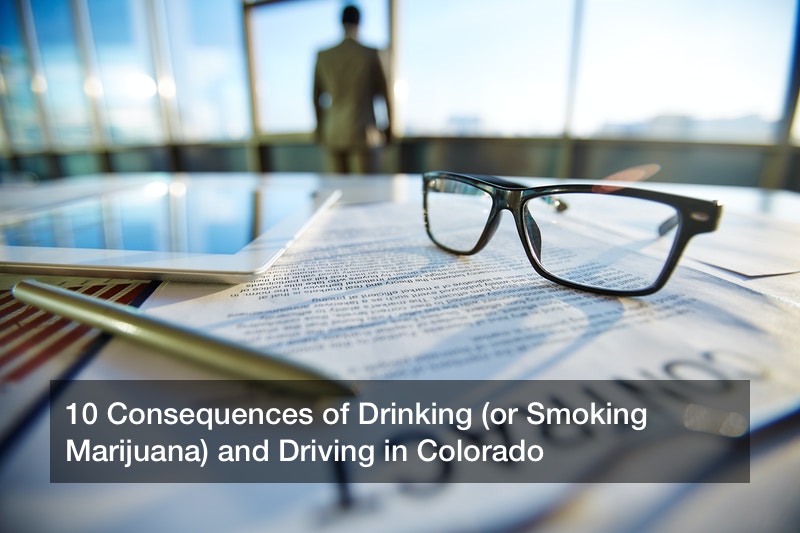
Driving while impaired is very dangerous. Over 10,000 Americans die every year due to drunk driving and most states have taken a very hard stance against driving under the influence (DUI) of alcohol or drugs.
Colorado is no exception. Colorado law requires jail time for everyone convicted of DUI charges in Colorado. And even though Colorado has one of the most permissive approaches to marijuana in the U.S., police can recommend DUI charges in Colorado if you drive after smoking cannabis.
Traffic Stop
You may get away with driving while drunk or high. However, police can stop you based on any reasonable suspicion of DUI or driving while ability-impaired (DWAI). This suspicion can include violations of any traffic laws such as:
- Erratic driving
- Speeding
- Changing lanes without signaling
- Collision
- Stopping on the road
Keep in mind that you do not need to violate a traffic law to be stopped. If you are driving in a way that raises a reasonable suspicion that you are impaired, the police can stop you even if you are doing nothing illegal. For example, driving too slowly is not necessarily a traffic violation, but can provide the police with a reasonable suspicion that you are impaired.
Moreover, police can conduct a traffic stop if your vehicle does not meet Colorado’s equipment standards. A broken tail light can be the basis of a traffic stop and this can spiral into DUI charges in Colorado once the officer observes your condition or behavior.

When you are stopped, the officer can request your name, address, and an explanation of your driving actions. This is not an arrest and, therefore, at this point you would not have the right to a lawyer. Moreover, at this point you would not be involuntarily detained, so you would not need bail advice. However, fleeing or obstructing the officer in the investigation might lead to more charges than just a DUI or DWAI. So, the best option is usually to cooperate.
Drug or Alcohol Test
Applying for, and receiving, a driver’s license is interpreted as consent to a breath, blood, saliva, or urine test if an officer suspects that you are under the influence of drugs or alcohol. If you refuse to submit the test, it may be taken as an admission against you in any court trial. Moreover, the Colorado Division of Motor Vehicles may increase the administrative penalties, such as a longer license suspension, if you refuse to take a drug or alcohol test.
More importantly, refusing to take a drug or alcohol test will not prevent prosecutors from filing DUI charges in Colorado for a few reasons:
- Observation: A police officer’s or other witness’s observation that you were substantially incapable of exercising the judgment, physical control, or care needed to drive is enough for DUI charges in Colorado.
- DWAI charges: If a police officer cannot determine whether you were “substantially incapable” of driving, they can still charge you with DWAI which only requires that you were affected “to the slightest degree” in your driving ability.
- Involuntary testing: In a drunk driving accident in which someone is killed or seriously injured, the police may require a blood or urine test.
In Colorado, the statutory limit for blood alcohol limit is 0.08% and the statutory limit for THC (the psychoactive chemical in marijuana) is 5 nanograms per milliliter of blood. If you consent to a test and your levels exceed the statutory limits, the judge or jury can infer that you were impaired.
Arrest
If the police have probable cause to believe you violated Colorado’s DUI or DWAI laws, you will be arrested. The difference between spending a night (or more) in jail and a traffic ticket relies entirely on whether your driving violations were the result of drugs or alcohol, or just bad driving.

An arrest is everything that you might dread. Your car will be left on the side of the road and the police will call a tow truck to impound it. Most cities and counties in Colorado have a local impound lot where your vehicle will be stored. To retrieve your car, you will need to show documents proving ownership, registration, and insurance. You will also need to pay fees for towing, impound, storage, and administration.
While your car is locked in the impound lot, you may also be booked and locked in jail. Depending on your physical condition and the severity of the charges, the police may be willing to book you and release you. However, if you have no one to pick you up, are severely intoxicated, are belligerent, or have been booked for more than just simple DUI charges in Colorado (like vehicular assault or vehicular homicide), the police may be unable to safely release you and you might spend at least one night in jail.
If you are arrested early enough, you might be able to appear in court and call for bail bond services after spending only a few hours in a holding cell. However, in more populous cities and counties, courts are backed up and judges may take several days before setting your bail.
Initial Court Appearance
During your initial court appearance, the judge will inform you of the charges against you and determine the conditions of your release. In most cases of DUI charges in Colorado, the judge will read a brief statement saying that you are being charged with driving a vehicle “under the influence of,” in the case of DUI, or “while impaired by,” in the case of DWAI, drugs, alcohol, or both.
At this point, you will likely be represented by a public defender if you have been transported from jail to your initial court appearance since you would not have had the opportunity to hire a private lawyer. The public defender will likely advise you to say nothing and just let the appearance play out.
You may be asked to enter a plea of guilty or not guilty at this point as well. However, in most cases, this step is reserved for a separate arraignment so you can have time to consult a lawyer before entering a plea.
If all goes well, the judge will also set your bail amount during the initial appearance. This will enable you to bail out of jail as long as you have the cash to pay the bail or secure a bail bond. Once bail is posted, the court will be comfortable ordering the jail to release you.
Hire a Lawyer
You will be advised during your initial appearance that you can have a free lawyer if your income does not allow you to hire one. If you can afford a lawyer, you will need to interview criminal defense attorneys to find the right one to defend you against DUI charges in Colorado.

Some of the factors that you might want to consider when deciding which lawyer to hire include:
- Fee structure: Does the lawyer charge by the hour or a flat fee? This could make a big difference if you want to take your case to trial and challenge your arrest or charges.
- Communication: Do you communicate well with the lawyer and does the lawyer understand your input about your defense? Does the lawyer adequately explain what will happen with your case and your options?
- Reputation: Do you know anyone who has used the lawyer for DUI charges previously? Are there any negative reviews or feedback online about the lawyer or the lawyer’s firm?
Remember that the lawyer works for you. If you feel like you and your lawyer do not see eye-to-eye about your case, meet with your lawyer and express your concerns. Lawyers never want to feel like a client is dissatisfied with the representation so your lawyer will likely either try to incorporate your strategy or agree to withdraw so you can find a new lawyer.
Work On Your Case
The penalties for DUI and DWAI can be stiff:
- First DWAI: Minimum of two days in jail, up to 180 days in jail. Minimum fine of $200 up to $500, plus at least 24 hours of community service.
- First DUI: Minimum of five days in jail, up to one year in jail. Minimum fine of $600 up to $1,000, plus at least 48 hours of community service.
- Subsequent convictions: The minimum amount of time in jail increases each time you are convicted of DUI charges in Colorado. On the fourth conviction, you could be sent to prison for two to six years.
Because these penalties are so harsh, you will likely work with your lawyer to develop a defense or negotiate a plea bargain. Most DUI charges in Colorado end with a plea bargain. If you have no affirmative defenses, like the test was flawed or your driving was impaired by health problems rather than drugs or alcohol, your best strategy might be to negotiate a deal.
Prosecutors negotiate deals to save them the time and effort of going to trial. Depending on the charges and your criminal record, if any, a prosecutor might have wide discretion in negotiating with the criminal law firm you hire to defend you. In many cases, paying a fine and serving community service will be preferable to the risk of jail time that comes from taking a case to trial.
Go to Trial
If you are unable to negotiate a plea deal, you will have to go to trial in your case. Trials can be highly unpredictable, so your DUI defense attorney will likely advise against it unless you have a very strong defense.
The most unpredictable part of a criminal trial is usually the jury. Sometimes you may get a highly sympathetic jury that will go easy on you. Other times, you will get a very strict jury that wants to throw the book at you. Since you never know which type of jury you might get, trials can be a gamble.
Receive Your Sentence
Whether you go to trial or work out a plea bargain, your time in court will likely end with sentencing. At sentencing, the judge will consider all the factors provided in the Colorado statutes and determine your punishment for being convicted of DUI charges in Colorado.
As mentioned above, your sentence may include jail time, a fine, and community service. However, if you negotiate a plea deal, the judge will usually follow the terms of the deal unless they are clearly unfair.

If your sentence includes jail time, you will likely get credit for time previously served. For example, if you receive a sentence of 30 days in jail but you served two days when you were arrested, you will only need to serve an additional 28 days in jail to complete your sentence. With good time and other reductions, you might spend substantially less than your full sentence in jail.
At sentencing, the judge will also release your DUI bail bond. This means that whatever collateral you posted for your bail will no longer be at threat of loss if you miss a court date.
Recover Your Life
Being convicted of DUI charges in Colorado can be life-changing. However, you should be able to recover your life over time.
You may have your driver’s license suspended, at least temporarily. However, Colorado allows most first-time offenders to reapply after 9 months of suspension. Moreover, if you have a need to keep your driver’s license due to financial hardship, you may be allowed to keep your license if you have an ignition interlock system installed on your car. This system prevents your car from starting until you pass a breathalyzer test.
You will need to recover your car from the impound lot. This will take some effort and can be very expensive, depending on how long the car was stored in impound. Moreover, Colorado law allows cars that are unclaimed for 30 days to be auctioned. If you lost your car, either due to damage or being unable to reclaim it from the impound lot, you may need to visit an auto dealer to replace it.
If you have to serve time in jail, you may lose your job. Moreover, depending on whether your DUI charges in Colorado was a misdemeanor or felony, you may have difficulty finding a new job. However, some jobs, like retail or office work, might be less stringent on DUI charges than on theft or assault charges.

Finally, you might need to seek drug or alcohol treatment. If your DUI charges in Colorado were due to a long-standing drug or alcohol problem, treatment may save you from repeat offenses. Also, Colorado law does allow you to avoid the minimum jail sentences if you attend drug or alcohol treatment.
Pay All the Costs
As you move on with life, you will need to shoulder all the burdens of your DUI. In addition to direct costs like fines, court fees, and impound fees, you might be sued for injuries or damage caused if you were in a drunk driving accident. Moreover, a DUI conviction will cause your auto insurance premiums to skyrocket or even render you uninsurable.
However, keep in mind that you will eventually overcome all these costs. And as long as you are able to avoid future charges, you will have learned your lesson.




